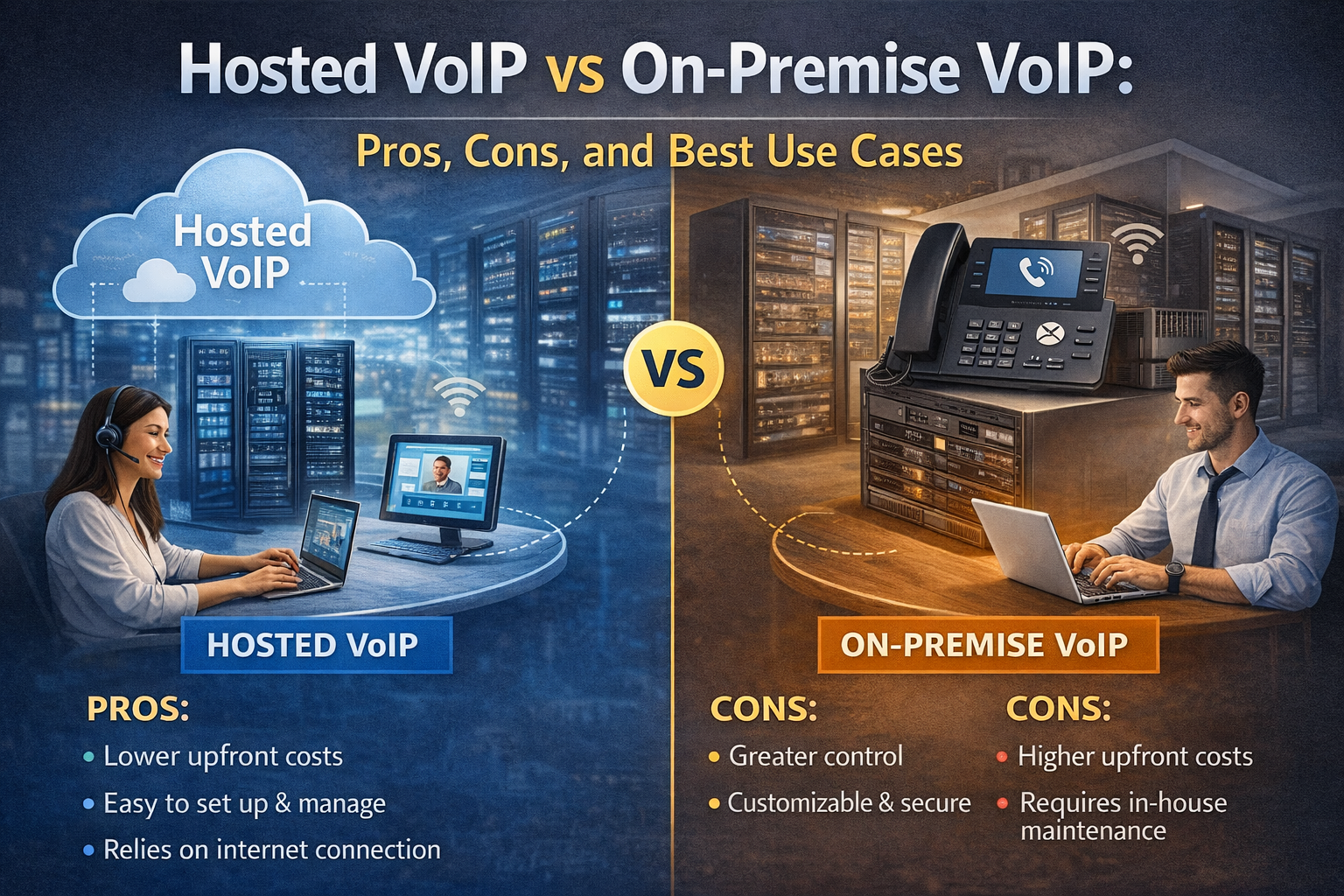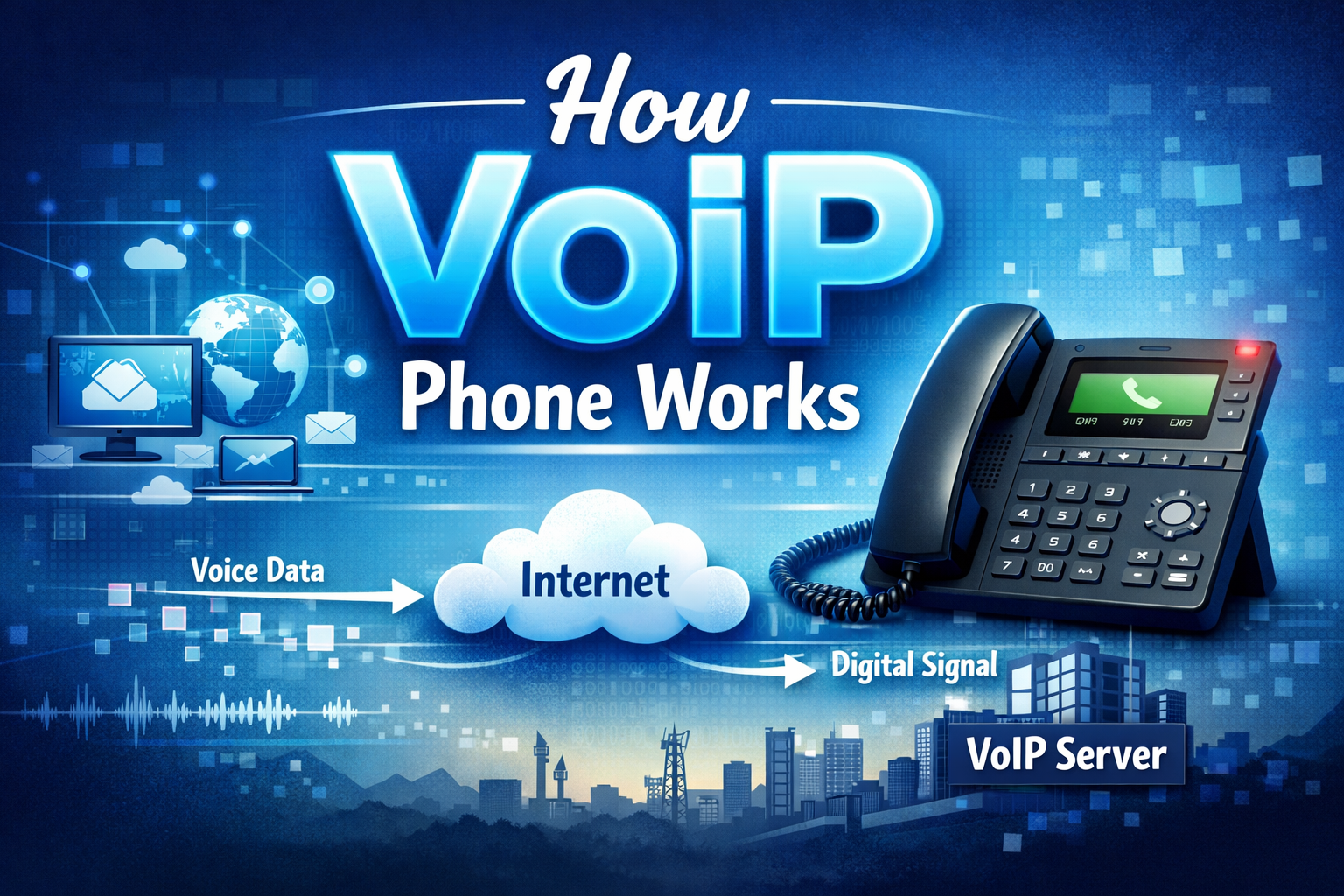The importance of efficient communication technologies in modern globalized world cannot be over-rated. These technologies play a vital part in empowering organizations with proper communication, creating connections, accelerating progress and enabling a global presence and connectivity. The use of voice over internet protocol (VoIP), VoIP phone over Wifi, and Wifi calling has redefined the entire concept of communication, regardless of the level of communication, whether personal or commercial.
Nonetheless, there are also some limitations. Not all ways of communicating are good and acceptable to all. To a great extent, it is dependent upon usage and purpose intonated. Naturally, the business phone system is different and needs to be as continuity-wise and reliable as possible. Both VoIP and Wifi calling have their specifications.
This blog will help you have a deep understanding of both technologies to be able to decide which one fits best in the future:
What is VoIP Calling?
Voice over IP calling is also known as VoIP calling is a working mechanism of voice over internet protocol (VoIP) which helps you make and receive calls using the internet and any device. It breaks your voice into little bits of data, and gives the voice data priority over any other data traffic to make your voice calls crystal clear.
VoIP is a general term that comprises VoIP phone services, virtual numbers, APIs and multiple other services to ensure everyone enjoys the process of calling. It is an analogue-digital-analogue calling device that allows improved calling experience.
Advantages of VoIP Calling
- Economical: VoIP telephone calls are much cheaper when compared to landline telephony particularly long-distance or international calls.
- Flexibility: VoIP services can be used on different devices, including tablets, smartphones, and desktops. It will enable your agents to be more flexible.
- Advanced features: Advanced VoIP systems provide such features as call forwarding, voicemail, and conference calling at a significantly reduced cost than the traditional phone system.
- Scalability: VoIP is easy to scale to the size that your company requires.
- Integration: An integrated VoIP solution may be integrated with other business solutions, including CRM and customer care systems, among others, to enhance efficiencies.
Disadvantages of VoIP Calling
- Internet dependency: VoIP uses a steady internet connection, which may be inconvenient in regions with low internet coverage or when there is an internet failure.
- Technical complexity: VoIP systems may require more technical complexity to set up and configure than traditional phone systems. You may need professional assistance.
How Does a VoIP Call Work?
VoIP calls start with a normal telephone call, which is initiated either using a computer or a smartphone using a VoIP application. The microphone that picks up your voice immediately you start speaking translates it into electrical impulse. After conversion, an analog to digital converter (ADC) divides them into small data packets to be transmitted.
The cloud-hosted PBX further compresses these data packets in order to give them priority over other data such as emails, media, etcetera. At the other end the ADC of the recipient changes the tiny data packets back to your voice signals and the speakers play it.
What is WiFi Calling?
Voice over WiFi (VoWiFi) or WiFi calling means that you can use WiFi to call rather than using your mobile network carrier. WiFi calling is a trendy communication medium nowadays that does not need any physical telephone connections or a particular app.
The majority of smartphones available today are WiFi calling compatible and have this feature built in to use. You can easily use a single toggle button to activate them and you can use them to make calls without having to use your cellular provider.
Advantages of WiFi Calling
- Improved coverage: WiFi calling has the potential to offer improved coverage in locations where the network is weak.
- Clarity: WiFi calling has better call quality as compared to traditional calling, particularly in poorly covered areas.
- Integration: WiFi calling may be integrated with other WiFi-enabled services and devices.
Disadvantages of WiFi Calling
- Requires WiFi capability: WiFi calling needs you to have WiFi capability on your network.
- Compatibility: WiFi calls are not compatible with every computer or network provider.
- Features: WiFi calling does not offer business-specific features.
- Security issues: WiFi calling may be vulnerable to security threats when the network is not secure.
How Does a WiFi Call Work?
WiFi or WiFi calling is your current mobile service over WiFi network. It relies on your WiFi network rather than cell towers to make and receive calls. When you are on the WiFi, and your cell phone has a weak connection, your phone will use WiFi technology to make the call.
In this case, your voice is turned into data packets similar to a VoIP call, but they are transmitted through the infrastructure of your mobile carrier to the number of the recipient.
VoIP vs. WiFi Calling: Selecting the Appropriate Channel
Although the two calling methods are to some extent similar to each other, they address two distinct use cases and markets.
The following are some of the considerations that may be used to decide between VoIP vs WiFi calling service:
i. Calling Nature
The nature of your daily calling is the most important factor to consider. As WiFi calling needs taking calls using your current number, on the same coverage network, it perfectly suits the purpose of personal calling.
On the flip side, VoIP calling could be used to conduct fluent local and international calling without exposing your phone number. It provides profound call insight and real-time monitoring and reports. Hence, it will be more appropriate for business communication.
ii. Network Coverage
One of the most important deciding factors as far as VoIP vs WiFi calling is concerned is your location. Use wifi calling where the cellular network is weak, assuming that you have a working WiFi connection. It will replace your cellular calling and keep the communication steady.
Whereas VoIP calling may be an option where there is business communication as VoIP phone services are more scalable than regular calling. You can make and receive international calls at a fraction of the rate, with more calling features, using our virtual numbers.
iii. Cost-Effectiveness
Calls through WiFi that appear to be free initially may cost you much more than normal calls. Although the calls are free, the information that is used to make the calls is not free. No matter what mobile phone provider you choose, the data used over WiFi is very heavy compared to VoIP services, which are designed with heavy call volumes in mind.
VoIP phone providers have many options that provide the flexibility and pay-as-you-go plans on a user-count basis, providing high-quality VoIP calling at affordable rates. Some even have a smooth integration with inbound call center programs, which makes them scalable and cost-effective to teams managing customer calls or placing sales calls.
iv. Features
WiFi provides comparable calling features to your normal calling such as voicemail, caller ID, etc. to retain basic calling capabilities, but without meaningful cellular range. Business VoIP, on the other hand, can provide rich communication experience by offering numerous features like call recording, analytics, live monitoring, reporting, IVR, etc. VoIP calling services are your preferred choice in case the communication you need involves a lot of monitoring and functionality.
Bottom Line – VoIP vs. Wi-Fi Calling
When you have discussed all the aspects of VoIP vs WiFi calling, you can choose the approach that best appeals to your needs. Remember where you are, calling nature, and budget, and then decide between the two calling services.
WiFi calling is the right solution for you to make domestic calls using your phone number. When you need to call overseas companies and individuals, and when you have to receive more calls, VoIP calling is the correct service to have.
FAQs – VoIP vs. Wi-Fi Calling
Q1. Will I require VoIP when I have Wifi calling?
VoIP and Wifi calling are two similar but different technologies related to one another. VoIP is the same idea underpinning Wifi calling and hence the name VoIP over Wifi. VoIP has some advanced features but there are certain limitations as well. It relies on how the user uses it and what communication technology is more suitable.
Q2. What are the demerits of Wifi calling?
Only mobile phones can be used in this feature, it does not have any advanced features given, it sometimes comes with extra costs of mobile data use and even the quality of calls vary due to bad internet connection.
Q3. Does VoLTE equate to Wifi calling?
Voice over long term evolution (VoLTE) is the type of communication technology that enables users to make/receive 4G networks. This is unlike the Wifi calling which uses the Wifi network to make a call.
Q4. What is the significant benefit of VoIP?
VoIP is more flexible, reliable, cheaper and has a number of advanced features. These are features that are best suited to business users.
Q5. Can I use my mobile for VoIP?
You can also make your mobile phone Wifi and VoIP calls. But the VoIP can be available and can also operate with other IP enabled devices as well, but this cannot be done with Wifi calls.
Read More : What Is Level 3 VoIP? A Complete Beginner’s Guide
Read More : What Is BYOC and Why It Matters for Your Business?



